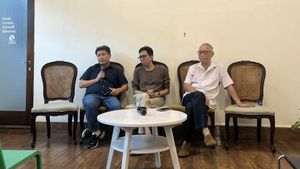JAKARTA - The National Human Rights Commission (Komnas HAM) has announced the results of the examination of alleged human rights violations in the National Insight Test Assessment (TWK) for employees of the Corruption Eradication Commission (KPK). As a result, 11 rights violations were found and there was a stigma from the Taliban against employees that could not be controlled.
Komnas HAM commissioner Choirul Anam said the employees removed from the TWK were those who had been labeled the Taliban from the start.
"The process of changing the status of KPK employees to ASN through the TWK assessment until the inauguration on June 1, 2021 is strongly suspected as a form of getting rid of certain employees with certain backgrounds, especially those who are stigmatized or labeled as Taliban," said Anam when reading the results of the report on alleged human rights violations. held online, Monday, August 16.
The Taliban label is intended for KPK employees who work professionally so that they cannot be controlled by any party. Thus, the labeling or stigmatization cannot be accounted for, factually and legally and is considered a form of human rights violation.
"Even though the institutional character of the KPK or the internal KPK refers to the institution's code of ethics, it actually provides space to be critical in carrying out internal control and law enforcement work in eradicating corruption," said Anam.
He also mentioned that the implementation of the TWK Assessment was a condition for the transfer of employee status, not merely to carry out the mandate of the KPK Law Number 19 of 2019. According to Anam, the test actually had another intention, namely removing certain employees from the KPK.
"The implementation of the law is used as a momentum to confirm the existence of stigma and labels within the KPK internally," he said.
Not only is the stigma given intentionally, this test process has also been carried out arbitrarily, abuse of power, and is not in accordance with the law, there is even an element of deliberate planning for a specific purpose.
One example is the involvement of third parties, namely the TNI Strategic Intelligence Agency (BAIS), the Army Psychology Service, the National Counter-Terrorism Agency (BNPT), and the State Intelligence Agency (BIN) which is groundless because the memorandum of understanding between the KPK and the National Intelligence Agency was not used. State Civil Service (BKN).
In addition, the signing of the document has also been found to manipulate the date or back date. "Thus, BKN's cooperation with third parties such as BAIS, the Department of Psychology AD, BNPT, and BIN also has no legal basis," said Anam.
According to him, the cooperation does refer to the Regulation of the Head (Perka) of BKN and the form of Commission Regulation (Perkom) Number 1 of 2021. "However, the technical implementation of the cooperation is carried out without a clear legal basis. Moreover, in substance, content and substance of the Perka The BKN is not suitable to be used as a reference for cooperation with third parties," he said.
For this reason, Komnas HAM concluded that there were 11 rights violations that had occurred in the TWK assessment process as a condition for the transfer of the status of KPK employees, namely the right to justice and legal certainty; women's rights; the right not to discriminate; the right to freedom of religion and belief; right to work; and the right to security.
The next right that is violated is the right to information; right to privacy; the right to freedom of assembly and association; the right to participate in government; and the right to freedom of expression.
5 recommendations that must be implementedAfter finding 11 violations related to the implementation of TWK, Komnas HAM then issued a recommendation which was then submitted to President Joko Widodo (Jokowi). This submission to the former Governor of DKI Jakarta was made because he is the highest authority holder of the government and the highest staffing officer.
There are five recommendations issued by Komnas HAM. The first is to restore the status of KPK employees who are declared ineligible in the TWK to then be appointed as ASN.
This recovery is also an effort to follow up on President Jokowi's direction from time to time that TWK cannot be the basis for dismissing employees.
In addition, this recommendation is also in line with the decision of the Constitutional Court (MK) which in its consideration stated that the transfer of KPK employee status should not harm the rights of KPK employees to be appointed as ASN for any reason.
Second, Komnas HAM recommends the president to conduct a thorough evaluation of the TWK implementation process for KPK employees.
"Furthermore, making efforts to guide all ministry/institutional officials involved in the TWK assessment so that in carrying out their authority they comply with the laws and regulations, and uphold the principles of professionalism, transparency, accountability, and fulfill the principles of justice, and must comply with human rights standards," he said. Komnas HAM chairman Ahmad Taufan Damanik at the same press conference.
Fourth, Komnas HAM recommends the need to strengthen national insight into law and human rights in which the value of these actions must be a code of conduct for each ASN.
"Finally, the restoration of the good name of KPK employees who are considered TMS. Because this concerns their human rights," said Taufan
The English, Chinese, Japanese, Arabic, and French versions are automatically generated by the AI. So there may still be inaccuracies in translating, please always see Indonesian as our main language. (system supported by DigitalSiber.id)













